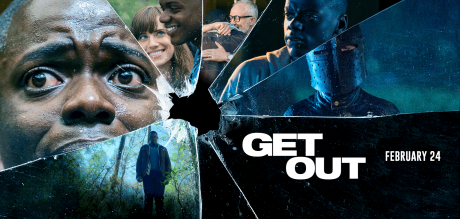Arts
You are here
Get Out – movie review

March 24, 2017
Jordan Peele's new movie Get Out is a cautionary tale for Blacks in Trump's America and a funny, biting, ironic horror movie that entertains as it lampoons white liberals and uncovers the racism oh so close to the surface.
Peele is one half of the comedy skit duo Key (Keegan-Michael Key) and Peele, who mixed humour and politics to great effect on Comedy Central.
The story opens with a young Black man searching fruitlessly for an address in a leafy all-white suburb. It is a nice turning of the tables on countless movies where white characters are shown to be terrified walking in the inner city and encountering only menacing Black or Brown faces.
This first scene will come back to haunt us later on in the movie but all is seemingly well as Chris (British actor Daniel Kaluuya) and his girlfriend, Rose (Allison Williams) leave for a long weekend in the countryside to stay with Rose's parents.
Although, the fact that Chris feels compelled to ask his girlfriend about her parents: "Do they know I'm Black?" before they set off for the country, sets off some alarm bells. Certainly Chris' buddy Rod Williams (played by Lil Rel Howery to great comic effect) has a pretty strong gut feeling that this is NOT a good idea.
Rod is a Transportation Security Administration (T.S.A.) officer and as Howery says about his character, "This is the first time in the history of cinema that a T.S.A. agent is the hero." And certainly he's an anomaly in the current context of airport harassment of minorities and Muslim bans.
In the time-honored tradition of horror movies, all is sunny and cheerful as the young couple in love set off for Rose's parents' country home, but an incident involving a deer and a white police officer foreshadows that all may not go well in this rural paradise.
When Chris meets the parents, Dean and Missy Armitage (Bradley Whitford and Catherine Keener), all seems fine on the surface. They seem unfazed by the fact that Chris is Black, but there is something about their efforts to appear welcoming and liberal that creates an uneasy feeling that all is not as it seems.
Dean insists that he would have voted for Obama a third time if he could have (as Rose predicted he would), awkwardly sprinkles his conversation with what he clearly believes is 'urban' slang and tells a very weird story about his father (and also Hitler, incidentally) having been humiliated by Black athlete Jesse Owens in the 1936 Olympics.
In some ways, Missy is the more chilling of the two, with a piercing stare behind her kindly facade. She is a psychiatrist who sees patients in her home and who offers to hypnotize Chris to help him stop smoking, a 'filthy habit', according to Missy. Tea cups have never been more full of menace than they become in Peele's movie.
Peele cleverly uses the horror trope in Get Out to get at some home truths that are clearly designed to unsettle and make us question our assumptions. The horror in this film comes from Chris's perspective of being an outsider by virtue of the colour of his skin, no matter how much Rose's family and their friends put up a civilized front.
The other thing that puts Chris off-balance from the moment of his arrival at the Armitage's charming 'colonial' home are the two Black servants who have stayed on after the death of Dean's parents. As Dean says, he couldn't let them go, although he realizes 'the optics aren't great'.
Chris tries to talk to both the groundskeeper and the maid, but can't find any way in. Their reactions to him and their lack of any kind of normal conversation puzzles him and us. There is something 'off' about them that Chris tries vainly to pinpoint or understand.
The most chilling scene of the whole movie is probably the 'party' that happens while Chris is there – an annual event which Rose forgot was happening on this particular weekend. Her parents' friends, all a certain age and all of course almost blindingly white, are scarier than any zombies or ghouls you might meet in any run of the mill scary movie.
The paranoia that Chris begins to feel seems only too justified and reminded me of a film from the early 1970s, the Stepford Wives. In that film, it's independent women who become the targets of a frightening sexist culture, just as Get Out paints a picture of the reality of racism bubbling under the surface of so-called 'polite' society.
Register today for the conference One Solution, Revolution: Marxism 2017, April 21 and 22 in Toronto.
Section:
Topics:









